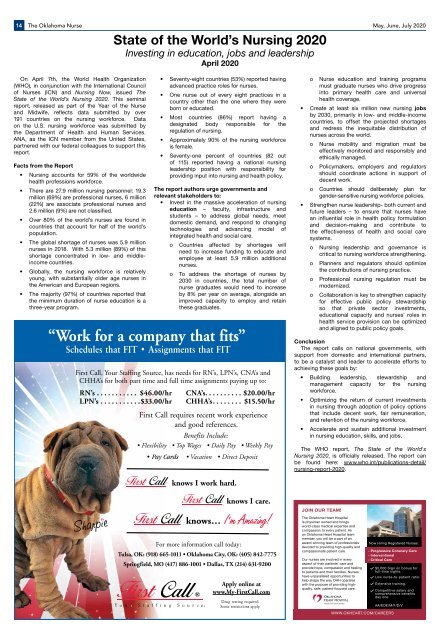The Oklahoma Nurse - May 2020
- No tags were found...
Create successful ePaper yourself
Turn your PDF publications into a flip-book with our unique Google optimized e-Paper software.
14<br />
<strong>The</strong> <strong>Oklahoma</strong> <strong>Nurse</strong> <strong>May</strong>, June, July <strong>2020</strong><br />
State of the World’s Nursing <strong>2020</strong><br />
Investing in education, jobs and leadership<br />
April <strong>2020</strong><br />
On April 7th, the World Health Organization<br />
(WHO), in conjunction with the International Council<br />
of <strong>Nurse</strong>s (ICN) and Nursing Now, issued <strong>The</strong><br />
State of the World’s Nursing <strong>2020</strong>. This seminal<br />
report, released as part of the Year of the <strong>Nurse</strong><br />
and Midwife, reflects data submitted by over<br />
191 countries on the nursing workforce. Data<br />
on the U.S. nursing workforce was submitted by<br />
the Department of Health and Human Services.<br />
ANA, as the ICN member from the United States,<br />
partnered with our federal colleagues to support this<br />
report.<br />
Facts from the Report<br />
• Nursing accounts for 59% of the worldwide<br />
health professions workforce.<br />
• <strong>The</strong>re are 27.9 million nursing personnel: 19.3<br />
million (69%) are professional nurses, 6 million<br />
(22%) are associate professional nurses and<br />
2.6 million (9%) are not classified.<br />
• Over 80% of the world’s nurses are found in<br />
countries that account for half of the world’s<br />
population.<br />
• <strong>The</strong> global shortage of nurses was 5.9 million<br />
nurses in 2018. With 5.3 million (89%) of this<br />
shortage concentrated in low- and middleincome<br />
countries.<br />
• Globally, the nursing workforce is relatively<br />
young, with substantially older age nurses in<br />
the American and European regions.<br />
• <strong>The</strong> majority (97%) of countries reported that<br />
the minimum duration of nurse education is a<br />
three-year program.<br />
• Seventy-eight countries (53%) reported having<br />
advanced practice roles for nurses.<br />
• One nurse out of every eight practices in a<br />
country other than the one where they were<br />
born or educated.<br />
• Most countries (86%) report having a<br />
designated body responsible for the<br />
regulation of nursing.<br />
• Approximately 90% of the nursing workforce<br />
is female.<br />
• Seventy-one percent of countries (82 out<br />
of 115) reported having a national nursing<br />
leadership position with responsibility for<br />
providing input into nursing and health policy.<br />
<strong>The</strong> report authors urge governments and<br />
relevant stakeholders to:<br />
• Invest in the massive acceleration of nursing<br />
education – faculty, infrastructure and<br />
students – to address global needs, meet<br />
domestic demand, and respond to changing<br />
technologies and advancing model of<br />
integrated health and social care.<br />
o Countries affected by shortages will<br />
need to increase funding to educate and<br />
employee at least 5.9 million additional<br />
nurses.<br />
o To address the shortage of nurses by<br />
2030 in countries, the total number of<br />
nurse graduates would need to increase<br />
by 8% per year on average, alongside an<br />
improved capacity to employ and retain<br />
these graduates.<br />
o <strong>Nurse</strong> education and training programs<br />
must graduate nurses who drive progress<br />
into primary health care and universal<br />
health coverage.<br />
• Create at least six million new nursing jobs<br />
by 2030, primarily in low- and middle-income<br />
countries, to offset the projected shortages<br />
and redress the inequitable distribution of<br />
nurses across the world.<br />
o <strong>Nurse</strong> mobility and migration must be<br />
effectively monitored and responsibly and<br />
ethically managed.<br />
o Policymakers, employers and regulators<br />
should coordinate actions in support of<br />
decent work.<br />
o Countries should deliberately plan for<br />
gender-sensitive nursing workforce policies.<br />
• Strengthen nurse leadership- both current and<br />
future leaders – to ensure that nurses have<br />
an influential role in health policy formulation<br />
and decision-making and contribute to<br />
the effectiveness of health and social care<br />
systems.<br />
o<br />
Nursing leadership and governance is<br />
critical to nursing workforce strengthening.<br />
o Planners and regulators should optimize<br />
the contributions of nursing practice.<br />
o Professional nursing regulation must be<br />
modernized.<br />
o<br />
Collaboration is key to strengthen capacity<br />
for effective public policy stewardship<br />
so that private sector investments,<br />
educational capacity and nurses’ roles in<br />
health service provision can be optimized<br />
and aligned to public policy goals.<br />
RN’s............ $46.00/hr<br />
LPN’s........... $33.00/hr<br />
• Pay Cards<br />
CNA’s...........$20.00/hr<br />
CHHA’s......... $15.50/hr<br />
Conclusion<br />
<strong>The</strong> report calls on national governments, with<br />
support from domestic and international partners,<br />
to be a catalyst and leader to accelerate efforts to<br />
achieving these goals by:<br />
• Building leadership, stewardship and<br />
management capacity for the nursing<br />
workforce.<br />
• Optimizing the return of current investments<br />
in nursing through adoption of policy options<br />
that include decent work, fair remuneration,<br />
and retention of the nursing workforce.<br />
• Accelerate and sustain additional investment<br />
in nursing education, skills, and jobs.<br />
<strong>The</strong> WHO report, <strong>The</strong> State of the World's<br />
Nursing <strong>2020</strong>, is officially released. <strong>The</strong> report can<br />
be found here: www.who.int/publications-detail/<br />
nursing-report-<strong>2020</strong>.<br />
For more information call today:<br />
Tulsa, OK: (918) 665-1011 • <strong>Oklahoma</strong> City, OK: (405) 842-7775<br />
Springfield, MO (417) 886-1001 • Dallas, TX (214) 631-9200

















